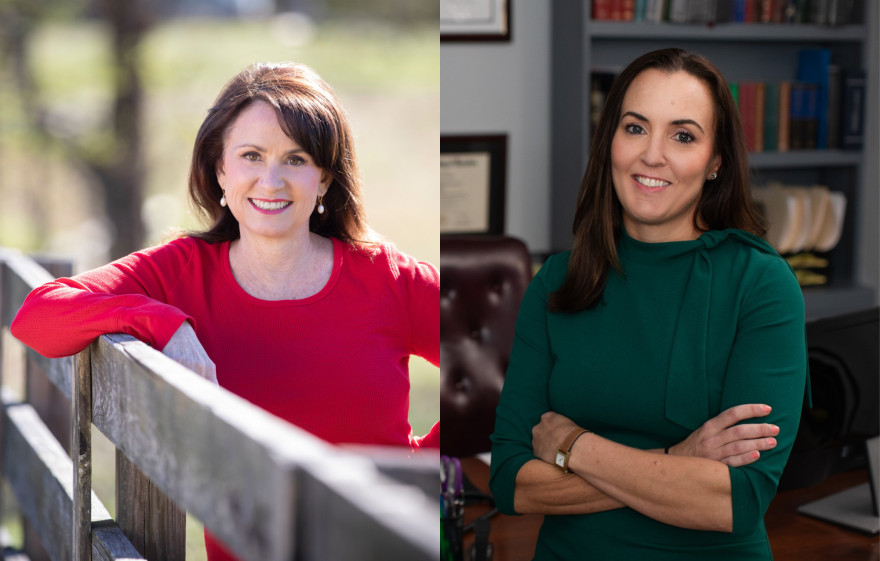Louisiana is set to elect its first female attorney general as two women from opposing parties head to a runoff in November’s general election.
Republican Liz Murrill, the state’s solicitor general, and Democrat Lindsey Cheek, an attorney from New Orleans, will face off after grabbing the highest percentages of votes in the primary. Murrill brought in 45% of the vote, and Cheek brought in 23%.
The outcome of the attorney general race will shape the politics of abortion, crime, oil and gas and more in the state.
“They have a great deal of power in shaping what our policy is going to look like in the future,” said Eugene Lee-Johnson, a political science professor at Southern University in Baton Rouge.
Everyday responsibilities include representing state agencies in lawsuits and advising the governor’s office and other state entities on state-related legal questions, Lee-Johnson said.
Control over most criminal cases is broadly left to district attorneys, and typically, the attorney general only steps in to prosecute if a district attorney is recused from a case.
While the office doesn’t have much actual power over crime, Lee-Johnson said it does have the power of public relations.
“When you're promoting these different ideas about what crime [looks] like or what punishment should look like, it often shapes how the state goes on those issues,” he said.
Lee-Johnson said the attorney general does have some criminal oversight, but only in specific areas like cyber crime and public corruption.
Republican Liz Murrill
If elected, Murrill has promised to reduce crime, an issue that was also a focus on the campaign trail for her boss, Republican Gov.-elect Jeff Landry, who has served as attorney general since 2016.
Murrill told Louisiana Considered her top priority as attorney general will be reducing crime rates, especially in the state’s metro areas, which have been ranked among the most dangerous in the country.
Despite the office’s minimal influence on crime, Murrill said she plans to use the office to provide support to district attorneys and the Louisiana Bureau of Investigation.
“We need to have all hands on deck to address that problem,” she said. “It’s not just the governor’s job to do that... It’s going to take everybody.”
Murrill’s campaign platform also includes expanding the office’s cyber crimes unit, which, among other things, investigates cases of child pornography.
Some see Murrill as Landry’s hand-picked successor. She serves as solicitor general, a role in the attorney general’s office that Landry created and appointed her to in 2016.
The two share similar conservative views, including supporting the state's near-total ban on abortion. Both have also defended the state’s contested congressional map, which includes just one district out of six in which a majority of the population is Black. The map is at the center of one of several court cases concerning redistricting and voting access in the South.
If Murrill is elected, she and Landry are expected to continue to have a close working relationship.
Democrat Lindsey Cheek
Cheek is politically different from Murrill and Landry in almost every way. Lee-Johnson said, if elected, her power as attorney general would be limited by Landry and the state’s majority-Republican Legislature.
In some cases though, she could act as a counterbalance to Republicans.
“She's not going to be powerless, but it's going to be very difficult for her to get some things done,” he said, adding that Cheek’s tenure would more so be about reframing the office’s priorities — and holding district attorneys accountable.
In an interview with Louisiana Considered, Cheek said she’d like to see a civil rights division in the attorney general’s office, with a focus on discrimination cases, voting rights and other concerns like abortion rights.
She added that the state’s abortion ban — one of the strictest in the nation — should, at minimum, provide exceptions in cases of rape and incest, provisions the law does not include.
“Doctors should not have to call their lawyer before they make a private medical decision with a patient,” Cheek said. “That is the situation that women and doctors are in since the criminalization of abortion.”
She said the primary role of the attorney general is to be a consumer advocate for residents. She pointed to environmental and public health issues, including Cancer Alley, an 85-mile stretch of land between Baton Rouge and New Orleans that is home to more than 200 petrochemical facilities.
Cheek said there’s no reason Cancer Alley should exist.
“Louisiana should not be a dumping ground for the carcinogens and toxins and waste products of the 800-plus refineries on the Mississippi River,” she said.
When it comes to addressing crime, Cheek supports expanding recidivism programs that emphasize rehabilitation and reintegration, which she says is a more sustainable solution than broad incarceration since it helps address the underlying causes of crime.
Cheek faces a tough path to victory in deep-red Louisiana, and her well-established opponent has significantly more funds on hand.
Adding to that difficulty, turnout in the primary was historically low, especially among Democrats and in Democrat-heavy areas like New Orleans, where just over a quarter of registered voters cast ballots. Turnout is expected to be even lower in the general election, in part because the governor’s race is already decided.
Cheek acknowledged the weak performance from Louisiana Democrats so far this election cycle, but said she remains positive about her own prospects.
“The financial resources available to Democrats compared to what Republicans had was just so skewed,” she said. “But I’m focusing on my race.”
The general election is Saturday, Nov. 18.





